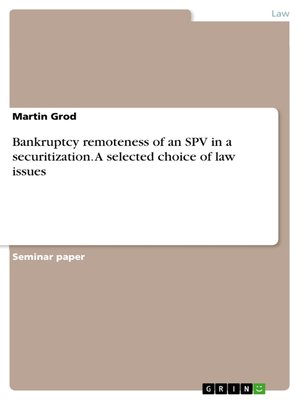Bankruptcy remoteness of an SPV in a securitization. a selected choice of law issues
ebook
By Martin Grod

Sign up to save your library
With an OverDrive account, you can save your favorite libraries for at-a-glance information about availability. Find out more about OverDrive accounts.
Find this title in Libby, the library reading app by OverDrive.



Search for a digital library with this title
Title found at these libraries:
| Loading... |
Seminar paper from the year 2015 in the subject Law - European and International Law, Intellectual Properties, grade: A, The University of Hong Kong, course: LL.M, language: English, abstract: The first part of his paper provides a general introduction to the process of securitization via an SPV. The second part of this paper addresses the bankruptcy remoteness of an SPV from a choice of law perspective by focusing on consolidation, transfer of assets and clawback. Securitization is the process of pooling assets (e.g. residential or commercial mortgages, consumer and student loans, auto loans, credit card debts, etc.) and separate risk into tradable securities. It is globally considered to be a very, if not the most innovative development in the modern financial markets whereas the goal is to raise cash at a lower rate compared to other financing alternatives such as corporate bonds or bank loans. Prior to the financial crisis that hit the world globally, securitization was booming and the issuance volume peaked in 2006 at around approximately USD 4 trillion. Following the crisis, this number slumped to about USD 500 billion in 2015. One of the peculiarities of securitization is its cross-border connection where multiple jurisdictions are involved for the designing, planning and implementation of the whole transaction and therefore, securitization tends to be a complex undertaking that requires not only a significant amount of legal and economical due diligence but also negotiation and legal work in form of analysis and document drafting. Additionally, to further complicate this issue, only a few countries have enacted specific laws for securitization. As a result, the choice of law aspects for securitization are manifold and need to be carefully investigated. The first part of this paper provides a general introduction to the process of securitization via an SPV. The second part of this paper addresses the bankruptcy remoteness of an SPV from a choice of law perspective by focusing on consolidation, transfer of assets and clawback.






